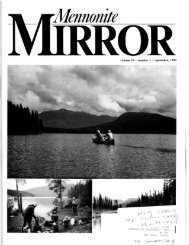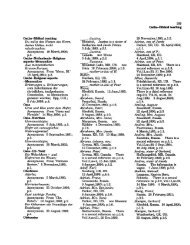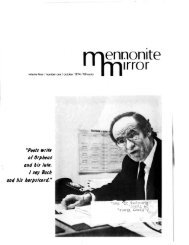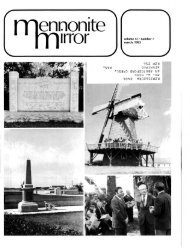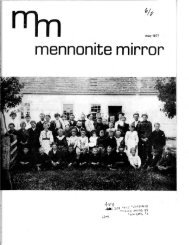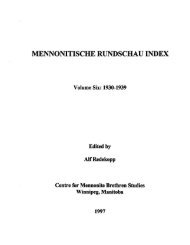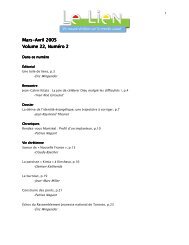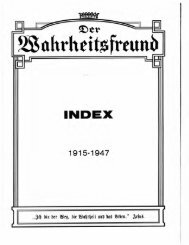• Donwood West opens new retirement option • - Canadian ...
• Donwood West opens new retirement option • - Canadian ...
• Donwood West opens new retirement option • - Canadian ...
Create successful ePaper yourself
Turn your PDF publications into a flip-book with our unique Google optimized e-Paper software.
Reflections on closing Eli:m Bible School<br />
by Philip Bender<br />
In her article, "Elim school winds down<br />
after painful decision" (MM, January,<br />
1988), Eleanor Loewen plots the chronological<br />
highlights of Elim Bible Institute<br />
since its beginning in 1929, but only "speculates"<br />
superficially at reasons for its<br />
formal closing on May 1. 1988.<br />
Since Elim has performed an important,<br />
faithful service to many Mennonite<br />
churches of southern Manitoba, I believe<br />
that a more careful. candid look at the<br />
factors which have brought about its closing<br />
is in order. While those factors are<br />
many and varied, I would like to identify<br />
several which seem to me to be particularly<br />
germane.<br />
First, the eclipse of a vision for Elim is<br />
the result of changing times. When Elim<br />
began, the Bergthaler Mennonite<br />
churches of southern Manitoba were<br />
more closed toward the outside world,<br />
and possessed a keener sense of theological<br />
and ethnic separateness than<br />
today. This included a rather distrustful<br />
stance toward schools, including Bible<br />
schools and colleges, even though the<br />
need for Bible training for church workers<br />
and youth was being felt.<br />
In this context Elim emerged with the<br />
overt purpose of providing Bible and<br />
related training to pastors, Sunday school<br />
teachers, prospective missionaries, and<br />
youth.<br />
But the school also served some<br />
equally-important sociological functions.<br />
It provided a sanctioned, safe place for<br />
rural Mennonite youth to develop wider<br />
peer relationships. And it also served to<br />
reinforce the Mennonite sense of ethnicl<br />
theological separateness, not least<br />
through offering much of its instruction in<br />
German. In my first year of teaching at<br />
Elim in 1976, an alumnus of the early<br />
1950s insisted to me, "Elim is a Bible<br />
school, not a Bible college." I still do not<br />
know all the nuances that polemical<br />
statement carried. It seems, however,<br />
that some cultural boundary maintenance<br />
and reinforcement of a peculiar<br />
theological/ethnic world view were<br />
implied. To quote Frank H. Epp, Elim,<br />
especially in its earlier phase but also up<br />
to its closing, was expected to help "keep<br />
the young people." (Mennonites in Canada,<br />
1920-40, paqe 447)<br />
In earlier days, many of those Mennonite<br />
young people did not finish public<br />
schools, but withdrew and opted instead<br />
for one or more winters at Bible school.<br />
Even more recently Elim continued to<br />
function for some as an alternative to the<br />
public school system. In 1964, less than<br />
half of the student body had exceeded<br />
grade 9. Not until 1970 had more than<br />
half finished grade 12.<br />
But times clearly have changed. Today<br />
rural Mennonite youth graduate from<br />
high school. College and university are<br />
less to be feared. Also, youth now are<br />
more independent, mobile, and affluent.<br />
For not a few, Bible school means travel to<br />
distant, exotic climes. For others, a noncredit<br />
Bible school does not contribute to<br />
a successful career climb. At a deeper<br />
level, rural Mennonite communities are<br />
less closed to the outside world, having<br />
accommodated wider cultural influences.<br />
If there is still in any sense a school to<br />
"keep the young people," it seems to have<br />
become - at least for General Conference<br />
Mennonites - the Bible college.<br />
It should be noted that Elim was not<br />
immune to the changes in its supporting<br />
constituency. One discernable shift in the<br />
past 20 years was the increasing sophistication<br />
of the faculty training and of the<br />
curricular content. Bible college and<br />
seminary degrees had become the norm<br />
for Elim teachers, while the school'S<br />
approach to biblical studies generally<br />
reflected the "higher critical" methodology<br />
of such institutions. Not without<br />
some foundation was the post-1975 Elim<br />
characterized as "a mini-CMBC."<br />
But recent years saw Elim faculty<br />
struggle to respect the increased educational<br />
and experiential background of<br />
their students without becoming a "de<br />
facto" Bible college. Elim's Mennonite<br />
constituency - and most students - continued<br />
to say, "We want a Bible school,<br />
not a Bible college," and Elim tried to<br />
accommodate.<br />
In the late 1970s and 1980s, efforts<br />
were made to develop a curricular model<br />
which sought to balance solid, academically-respectable<br />
Bible study with other<br />
intentional. structured learning goals,<br />
such as in worship/devotional life, Christian<br />
community living, and service training.<br />
Elirn's service program, for example,<br />
resulted in intensive course offerings in<br />
practical ministry, as well as in off-cam-<br />
pus study-service ventures at Koinonia<br />
Farms, Georgia; with Native Ministries in<br />
northern Manitoba; and at MCC service'.<br />
units from British Columbia to Labrador.<br />
Students affirmed these learning experiences,<br />
and crafting a Bible school with a<br />
distinct, updated identity seemed prom·ising.<br />
But the momentum of history in Manitoba<br />
was too strong, and after peaking Dt<br />
62 in 1982, the enrollment plummeted.<br />
Notwithstanding its determined, and, I<br />
believe, creative efforts to modernize<br />
without becoming that "college" it never<br />
was supposed to be, Elim for many in its<br />
constituency never could quite shake the<br />
image of being a second-class school a nd<br />
an anachronism in a more advanced era.<br />
It would not be simplistic to say that Elim,<br />
like dozens of other North American Bible<br />
schools before it, was a casualty of changing<br />
times.<br />
Second, Elim's closing was hastened by<br />
ambivalence in our churches over<br />
whether to be Anabaptist. A mark ofElim<br />
in the past decade or two, cited both by its<br />
advocates and its critics, was its Anabaptist<br />
orientation. A school promotions I<br />
brochure of the late 1970s boldly<br />
announced, "We are unashamedly Mennonite."<br />
And that image stuck.<br />
Practically speaking, Elim's Anabaptist<br />
approach meant three things which ultimately<br />
ran against the grain of many in its<br />
constituency. First, it governed the<br />
teachers' interpretation of scripture. The<br />
Bible was not read in a fundamentalist<br />
"flat-book" style, nor through dispensationa<br />
list lenses, though both are strong<br />
among southern Manitoba Mennonites.<br />
Rather, Christ was understood to be the<br />
centre of scripture and its interpretive<br />
key.<br />
Second, being Anabaptist meant that<br />
Elim stressed a wholistic view of salvation.<br />
Salvation, the faculty taught, is both<br />
"inner" and "outer." Word and deed,<br />
teachers argued, go together, and discipleship<br />
as "lived grace" is integral to the<br />
gospel. While the importance of personal<br />
commitment to Christ was never denied,<br />
and indeed often was affirmed, the accent<br />
finally fell on ethical fruit as the validation<br />
of living faith.<br />
Third, being a disciple of Jesus, most<br />
Elim teachers maintained, means a commitment<br />
to non-violence and peacemaking.<br />
Generally Elim faculty during my<br />
mennonite mirror/april 1988/9



